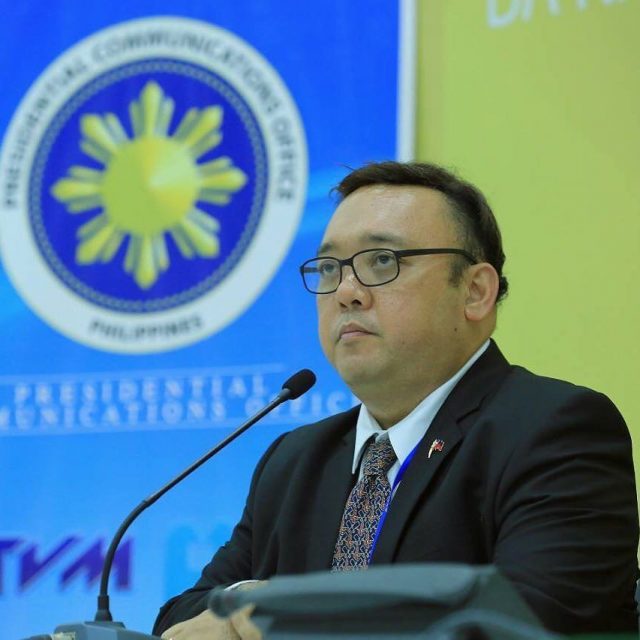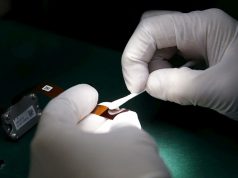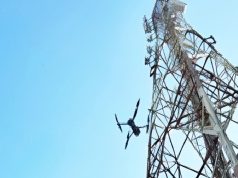MANILA – The “duopoly” in the local telecommunications industry, long the target of critics of slow internet in the country, will soon face a challenge, Presidential Spokesperson Harry Roque Jr. announced on Monday.
Roque said President Duterte wants the third telecom carrier in the Philippines to be operated by China, as an offshoot of his recent talks with Chinese Premier, who was in Manila for the 31st ASEAN and Related Summits and subsequently extended his stay for bilateral talks with Duterte.
At a Malacañang press briefing, Roque said “During the bilateral talks between President Duterte and the Chinese Premier, President Duterte offered to the People’s Republic of China the privilege to operate the third telecom’s carrier in the country.” The Chinese entity being eyed for the role of third telco has not been disclosed.
The two telecoms carriers are the Ayala-owned Globe Telecom and the MVP Group’s PLDT-Smart Communications. Though rivals, the two companies last year set up a joint venture to buy the premium broadband facility of a San Miguel Corp. affiliate in order to improve their services.
Roque said at Monday’s press briefing that Duterte is serious about the entry of the third telecommunications carrier and had given instructions that all applications be filed and acted upon directly by the Office of the Executive Secretary.
The announcement comes on the heels of the Philippine government’s move to officially seal a deal with a Facebook affiliate to build the Luzon Bypass Infrastructure project.
“Consumers can look forward now to better telecommunications, not just in terms of cellular technology, but also in terms of internet speed as well as access,” Roque underscored.
LUZON BYPASS
Last week, government described its partnership with Facebook on the Luzon bypass project as game changer that will vastly improve the country’s internet services.
Under the deal, Facebook will put up a submarine cable system landing in the east and west coasts of Luzon. The Bases Conversion and Development Authority will in turn build the two landing stations in Poro Point, La Union and Baler, Aurora, connected by a 250-kilometer cable corridor — projects collectively known as the Luzon bypass infrastructure which cost P975 million.
The Department of Information Communication and Technology (DICT) will afterwards operate and maintain the landing stations and put up the backhaul infrastructure connecting to end users.
The connection is slated to go online in 2019 and is seen to rival the combined bandwidth of dominant players PLDT and Globe, though the officials clarified that their project is meant to provide the infrastructure for the government’s internet project.
The Presidential Communications Operations Office (PCOO), in a press release Wednesday, said the goal is “to undertake a reliable and efficient government internet (SECURE GovNet) project.”
Project “secure govnet,” according to PCOO, “aims to build the “Luzon bypass infrastructure, an ultra high-speed information highway that will greatly improve the speed, affordability, and accessibility of broadband internet across the archipelago.”
DICT OIC-Secretary Eliseo Rio said under the agreements signed, Facebook “will provide the Philippine government with spectrum equivalent to at least 2 million megabits per second, significantly expanding the capacity available for the government’s connectivity programs. Such 2 terabytes per second is almost equal to the current combined capacity of Globe and Smart-PLDT, so puwede na kami maging [we can be a] third player.”
While the government fancies itself as now transforming into a third player in the telecom space, it will not exactly go head to head against incumbent players PLDT and Globe. For one, the project ties into the national broadband plan of the DICT, which primarily caters to unserved and underserved areas in the country. Though in addition to providing free access, the DICT said they are also looking how to lease certain network systems to small-scale internet service providers.
Rio said these “2 terrabytes we can get will truly improve the speed of our internet connection in free public wi-fi areas.” And, he added, “because more or less its cost is just what is called raw cost, it will make our internet very much cheaper.”
Facebook said the partnership with the government forms part of their efforts to further populate the internet.










